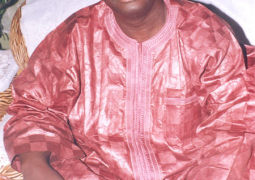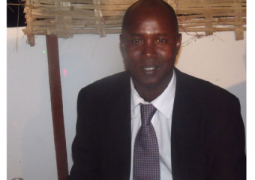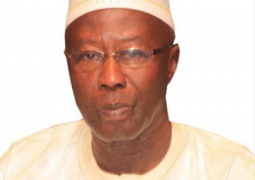'There is no doubt that the media remains the most important and if not the only source of information. It is common knowledge that information on human rights violations is always gotten from the media. The Genocide in Rwanda, the human rights abuses in Burundi, Zaire, Congo, to name but a few, were revealed by the media'- Dawda Jawara v. The Gambia, African Commission on Human and Peoples' Rights, Comm. Nos. 147/95 and 149/96 (2000).
The Constitution of a nation is its supreme law. All others laws must be consistent with it; a law that is contradictory of any provision of the constitution is usually struck off for unconstitutionality. No modern state can function properly without a constitution, whether it is written as in the case of most countries in the developing world or unwritten as in the case of the United Kingdom. Democratic and undemocratic states alike, every nation invoke constitutional provisions to give legitimacy to state actions.
The primacy and sanctity of the constitution has made it the safest place to house fundamental human rights. The preeminence of human rights requires that its protection is place beyond majorities and the vagaries of everyday politics. The assumptions that constitutions are not easy to amend, usually requiring larger majorities or referenda to effect certain major amendments. For these reasons, a whole chapter of the 1997 Constitution is dedicated to promotion and protection of fundamental human rights.
A general analysis of the Constitution reveals that the provisions of Chapter IV on media and human rights are broad and general. The Constitution does not articulate media human rights principles in a manner that places pre-eminence on these fundamental rights or does justice to international standards and ideals for promoting and protecting Human Rights. This may be because the Constitution concentrates its focus on the transition from military to civilian rule and in the process have conferred retroactive legitimacy to the actions of the Military government. As such, the 1997 Constitution makes equivocal commitment to freedom of expression and media rights.
Accordingly, in its expression of media and human rights norms and principles, the Constitution seeks to couch the contents of these rights to give effect only to the lowest common denominator of media and human rights principles and norms that the State is prepared to give effect to. The specificity with which media and human rights ideals are expressed could not have been similar to that of, for example, the constitution of South Africa, which came into force around the same time as the Gambian Constitution.
The lowest common denominator approach as espoused in the 1997 Constitution does not engender the development of vibrant and independent media nor does it strengthened the institutions of the rule of law. Moreover, the 1997 Constitution exhibits flaws and weaknesses in the following areas:
It incorporates and legitimises a number of Decrees, which are inimical to vibrant and independent media and weakens of human rights protection.
It does not espouse access to information as an ideal to be followed by the State.
The Constitution does not refer at all to access to state-held information.
It fails to recognise Customary International Law as part of the laws of the Gambia.
The result of a critical analysis of the Constitution reveals that the Chapter IV has inappropriately and/or inadequately, and/or not at all articulated the media and human rights norms and principles such as freedom of speech and expression, right of access to information, editorial independence and protection of confidential sources which are all essential prerequisite for the development of free, vibrant and independent media.
Further chapter IV of the 1997 Constitution is replete with claw back clauses derogating from the protection of fundamental human rights. For in-depth analysis, let's consider Section 25 of 1997 Constitution provides as follows:
(1) Every person shall have the right to-
freedom of speech and expression, which shall include freedom of the press and other media;
freedom of thought, conscience and belief, which shall include academic freedom;
freedom to practice any religion and to manifest such practice;
freedom to assemble and demonstrate peaceably and without arms;
freedom of association, which shall include freedom to form and join associations and unions, including political parties and trade unions;
Freedom to petition the Executive for redress of grievances and to resort to the Courts for the protection of his or her rights.
(2) Every person lawfully within The Gambia shall have the right to move freely throughout The Gambia, to choose his or her own place of residence within The Gambia, and to leave The Gambia.
(3) Every citizen of The Gambia shall have the right to return to The Gambia.
(4) The freedoms referred to in subsections (1) and (2) shall be exercised subject to the law of The Gambia in so far as that law imposes reasonable restrictions on the exercise of the rights and freedoms thereby conferred, which are necessary in a democratic society and are required in the interests of the sovereignty and integrity of The Gambia, national security, public order, decency or morality, or in relation to contempt of court.
The guarantee of press and other media rights is lumped together with other related rights such as conscience, belief and academic freedom and the freedom of association and movement throughout the country but all these rights are subject to Sub-section 4, which is the general limitation clause on all rights and freedoms guaranteed under our Bills of Rights. The 1997 Constitution of the Gambia embraces the international law test with regard to derogations from fundamental rights and freedoms. The Constitution requires that restrictions must be prescribed by law and should be reasonable and necessary in a democratic society.
The 1997 Constitution, however, does not provide guidance in the determination of the legal standards for derogations. The Constitution does spell out the interests that may justify limitations to media freedom. Importantly, the limitation clause does not provide that limitations on the rights and freedoms guaranteed must be in accordance with international human rights standards.
Therefore, on the matter of the protection of Media Rights and related Human rights, the 1997 Constitution fails to adequately define the principles or mechanisms for protection of these rights so eloquently stated in the definitions. It is submitted that restrictions on media freedom in the Gambia do not comply with international media and human rights standards. In my view, the Constitutional provision captures some of the principles spelt out in international legal instruments such as the ICCPR but it does not elaborate a mechanism for realizing the rights. Neither does the Constitution guarantee access to official information, processes and policies. In the absence of a direct sanction from the Constitution in this regard, the right guaranteed is ineffectual.
The Constitutional rights of the media and related human rights are a pledge to ensure a transparent democratic government after nearly three decades of secrecy and strict control. The value to democracy of government openness and accountability and of citizen participation cannot be underestimated. A multi-party system functions properly only when government is fully accountable to the people. The preamble to 1997 Constitution speaks eloquently of accountability, transparency and probity, which requires the population to have ready access to independent and accurate information about the workings of the administration, development issues and other matters of public concern.
Furthermore, what constitutes media freedom and human rights internationally has been captured in various international and regional instruments; the most common strand that runs through each of them espouses media freedom as a significant aspect of the broader right of freedom of expression. The various International instruments that recognize freedom of expression as a general right, and media freedom as an aspect thereof, include the International Covenant on Civil and Political, Universal Declaration of Human Rights. Within the African continent, the African Charter on Human and Peoples Rights (1981) also espouses the right of individuals to receive information, to express and disseminate opinions.
"The African Commission in its decision on communication 101/93 laid down a general principle with respect to freedom of association that "competent authorities should not enact provisions which limit the exercise of this freedom. The competent authorities should not override constitutional provisions or undermine fundamental rights guaranteed by the constitution or international human rights standards". This principle therefore applies not only to freedom of association but also to all other rights and freedoms1
The common international law principles which emerge from the jurisprudence of human rights treaty instruments are that the fundamental importance of the right to receive and impart information and ideas is to be respected by governments, and that limitations on that right must be provided for by law and necessary to protect a specific important societal interest, these interests vary somewhat from country to country. However, countries including the Gambia use public morality and national security reasons to limit the exercise of media and human rights related freedoms.
The test of the Government's commitment to the Constitutional guarantees of Human rights and to the right to freedom of expression is the extent to which these are translated into practice. The fundamental principles underlying the rights must also be embodied in national legislation implementing those rights by ensuring accountability, openness, participation and development. Freedom of information legislation is, then, essential in order to translate the constitutional right into concrete action and foster a culture of rights.
To be sure, media freedom and human rights are explicitly guaranteed in the 1997 Constitution and the limitation clause derogating from these guarantees are subject to the standards contained in international human rights instruments. Notwithstanding, the establishment of a constitutional order, the Gambia still faces major governance challenges, namely the infringement of the freedom of the media and disregard for the rule of law and due process. These are major governance issues considering that the media serves as the gauge in measuring the freedom of expression in any society. Also based on the principle of universality, indivisibility and inalienability of all human rights, the violation any media rights inexorably leads to the violation of other Human rights.
Furthermore, almost all members of the United Nations have agreed to follow the Universal Declaration of Human Rights. Article 19 of that Declaration states that
"Everyone has the right to freedom of opinion and expression; this right includes freedom to hold opinions without interference and to seek, receive, and impart information and ideas through any media regardless of frontiers."2 '
Free expression is essential to a democratic society. Free expression, distinguishes democratic from non-democratic countries. Self-government requires that citizens have accurate, adequate, and current information about issues facing their society. When ideas can be heard, examined, and questioned, society can develop culturally, economically, and scientifically. Free expression also allows people to vent their anger or frustration with the government and with other problems. It therefore decreases the likelihood that people will turn to violent means to express themselves. Freedom of expression remains one of the most basic rights in a democracy.
It is in light of this that the establishment of National Council for Civic Education, the Ombudsman, and the Independent Electoral Commission, which are all mandated by the 1997 Constitution, appears to redeem the constitutional pledges. These institutions have been in existence for a decade now but have yet to show great achievements in terms of their mandates, which is to encourage citizen's participation and inclusion in the governance processes of the country and to engender civic engagement, accountability and a democratic culture. In conclusion it must be said that empowering the people goes beyond merely stipulating fundamental rights in a constitution or establishing institutions to secure basic human rights. Empowerment goes further to bring closer the promise and opportunities of being a citizen in free country. It is based on the creed that all are created equal and that no one is above the law and justice is for all.
Almami Fanding Taal is Legal Practitioner with special interests in Human Rights, Media Laws, and Good Governance & Institutional Development
The Constitution of a nation is its supreme law. All others laws must be consistent with it; a law that is contradictory of any provision of the constitution is usually struck off for unconstitutionality. No modern state can function properly without a constitution, whether it is written as in the case of most countries in the developing world or unwritten as in the case of the United Kingdom. Democratic and undemocratic states alike, every nation invoke constitutional provisions to give legitimacy to state actions.
The primacy and sanctity of the constitution has made it the safest place to house fundamental human rights. The preeminence of human rights requires that its protection is place beyond majorities and the vagaries of everyday politics. The assumptions that constitutions are not easy to amend, usually requiring larger majorities or referenda to effect certain major amendments. For these reasons, a whole chapter of the 1997 Constitution is dedicated to promotion and protection of fundamental human rights.
A general analysis of the Constitution reveals that the provisions of Chapter IV on media and human rights are broad and general. The Constitution does not articulate media human rights principles in a manner that places pre-eminence on these fundamental rights or does justice to international standards and ideals for promoting and protecting Human Rights. This may be because the Constitution concentrates its focus on the transition from military to civilian rule and in the process have conferred retroactive legitimacy to the actions of the Military government. As such, the 1997 Constitution makes equivocal commitment to freedom of expression and media rights.
Accordingly, in its expression of media and human rights norms and principles, the Constitution seeks to couch the contents of these rights to give effect only to the lowest common denominator of media and human rights principles and norms that the State is prepared to give effect to. The specificity with which media and human rights ideals are expressed could not have been similar to that of, for example, the constitution of South Africa, which came into force around the same time as the Gambian Constitution.
The lowest common denominator approach as espoused in the 1997 Constitution does not engender the development of vibrant and independent media nor does it strengthened the institutions of the rule of law. Moreover, the 1997 Constitution exhibits flaws and weaknesses in the following areas:
It incorporates and legitimises a number of Decrees, which are inimical to vibrant and independent media and weakens of human rights protection.
It does not espouse access to information as an ideal to be followed by the State.
The Constitution does not refer at all to access to state-held information.
It fails to recognise Customary International Law as part of the laws of the Gambia.
The result of a critical analysis of the Constitution reveals that the Chapter IV has inappropriately and/or inadequately, and/or not at all articulated the media and human rights norms and principles such as freedom of speech and expression, right of access to information, editorial independence and protection of confidential sources which are all essential prerequisite for the development of free, vibrant and independent media.
Further chapter IV of the 1997 Constitution is replete with claw back clauses derogating from the protection of fundamental human rights. For in-depth analysis, let's consider Section 25 of 1997 Constitution provides as follows:
(1) Every person shall have the right to-
freedom of speech and expression, which shall include freedom of the press and other media;
freedom of thought, conscience and belief, which shall include academic freedom;
freedom to practice any religion and to manifest such practice;
freedom to assemble and demonstrate peaceably and without arms;
freedom of association, which shall include freedom to form and join associations and unions, including political parties and trade unions;
Freedom to petition the Executive for redress of grievances and to resort to the Courts for the protection of his or her rights.
(2) Every person lawfully within The Gambia shall have the right to move freely throughout The Gambia, to choose his or her own place of residence within The Gambia, and to leave The Gambia.
(3) Every citizen of The Gambia shall have the right to return to The Gambia.
(4) The freedoms referred to in subsections (1) and (2) shall be exercised subject to the law of The Gambia in so far as that law imposes reasonable restrictions on the exercise of the rights and freedoms thereby conferred, which are necessary in a democratic society and are required in the interests of the sovereignty and integrity of The Gambia, national security, public order, decency or morality, or in relation to contempt of court.
The guarantee of press and other media rights is lumped together with other related rights such as conscience, belief and academic freedom and the freedom of association and movement throughout the country but all these rights are subject to Sub-section 4, which is the general limitation clause on all rights and freedoms guaranteed under our Bills of Rights. The 1997 Constitution of the Gambia embraces the international law test with regard to derogations from fundamental rights and freedoms. The Constitution requires that restrictions must be prescribed by law and should be reasonable and necessary in a democratic society.
The 1997 Constitution, however, does not provide guidance in the determination of the legal standards for derogations. The Constitution does spell out the interests that may justify limitations to media freedom. Importantly, the limitation clause does not provide that limitations on the rights and freedoms guaranteed must be in accordance with international human rights standards.
Therefore, on the matter of the protection of Media Rights and related Human rights, the 1997 Constitution fails to adequately define the principles or mechanisms for protection of these rights so eloquently stated in the definitions. It is submitted that restrictions on media freedom in the Gambia do not comply with international media and human rights standards. In my view, the Constitutional provision captures some of the principles spelt out in international legal instruments such as the ICCPR but it does not elaborate a mechanism for realizing the rights. Neither does the Constitution guarantee access to official information, processes and policies. In the absence of a direct sanction from the Constitution in this regard, the right guaranteed is ineffectual.
The Constitutional rights of the media and related human rights are a pledge to ensure a transparent democratic government after nearly three decades of secrecy and strict control. The value to democracy of government openness and accountability and of citizen participation cannot be underestimated. A multi-party system functions properly only when government is fully accountable to the people. The preamble to 1997 Constitution speaks eloquently of accountability, transparency and probity, which requires the population to have ready access to independent and accurate information about the workings of the administration, development issues and other matters of public concern.
Furthermore, what constitutes media freedom and human rights internationally has been captured in various international and regional instruments; the most common strand that runs through each of them espouses media freedom as a significant aspect of the broader right of freedom of expression. The various International instruments that recognize freedom of expression as a general right, and media freedom as an aspect thereof, include the International Covenant on Civil and Political, Universal Declaration of Human Rights. Within the African continent, the African Charter on Human and Peoples Rights (1981) also espouses the right of individuals to receive information, to express and disseminate opinions.
"The African Commission in its decision on communication 101/93 laid down a general principle with respect to freedom of association that "competent authorities should not enact provisions which limit the exercise of this freedom. The competent authorities should not override constitutional provisions or undermine fundamental rights guaranteed by the constitution or international human rights standards". This principle therefore applies not only to freedom of association but also to all other rights and freedoms1
The common international law principles which emerge from the jurisprudence of human rights treaty instruments are that the fundamental importance of the right to receive and impart information and ideas is to be respected by governments, and that limitations on that right must be provided for by law and necessary to protect a specific important societal interest, these interests vary somewhat from country to country. However, countries including the Gambia use public morality and national security reasons to limit the exercise of media and human rights related freedoms.
The test of the Government's commitment to the Constitutional guarantees of Human rights and to the right to freedom of expression is the extent to which these are translated into practice. The fundamental principles underlying the rights must also be embodied in national legislation implementing those rights by ensuring accountability, openness, participation and development. Freedom of information legislation is, then, essential in order to translate the constitutional right into concrete action and foster a culture of rights.
To be sure, media freedom and human rights are explicitly guaranteed in the 1997 Constitution and the limitation clause derogating from these guarantees are subject to the standards contained in international human rights instruments. Notwithstanding, the establishment of a constitutional order, the Gambia still faces major governance challenges, namely the infringement of the freedom of the media and disregard for the rule of law and due process. These are major governance issues considering that the media serves as the gauge in measuring the freedom of expression in any society. Also based on the principle of universality, indivisibility and inalienability of all human rights, the violation any media rights inexorably leads to the violation of other Human rights.
Furthermore, almost all members of the United Nations have agreed to follow the Universal Declaration of Human Rights. Article 19 of that Declaration states that
"Everyone has the right to freedom of opinion and expression; this right includes freedom to hold opinions without interference and to seek, receive, and impart information and ideas through any media regardless of frontiers."2 '
Free expression is essential to a democratic society. Free expression, distinguishes democratic from non-democratic countries. Self-government requires that citizens have accurate, adequate, and current information about issues facing their society. When ideas can be heard, examined, and questioned, society can develop culturally, economically, and scientifically. Free expression also allows people to vent their anger or frustration with the government and with other problems. It therefore decreases the likelihood that people will turn to violent means to express themselves. Freedom of expression remains one of the most basic rights in a democracy.
It is in light of this that the establishment of National Council for Civic Education, the Ombudsman, and the Independent Electoral Commission, which are all mandated by the 1997 Constitution, appears to redeem the constitutional pledges. These institutions have been in existence for a decade now but have yet to show great achievements in terms of their mandates, which is to encourage citizen's participation and inclusion in the governance processes of the country and to engender civic engagement, accountability and a democratic culture. In conclusion it must be said that empowering the people goes beyond merely stipulating fundamental rights in a constitution or establishing institutions to secure basic human rights. Empowerment goes further to bring closer the promise and opportunities of being a citizen in free country. It is based on the creed that all are created equal and that no one is above the law and justice is for all.
Almami Fanding Taal is Legal Practitioner with special interests in Human Rights, Media Laws, and Good Governance & Institutional Development





